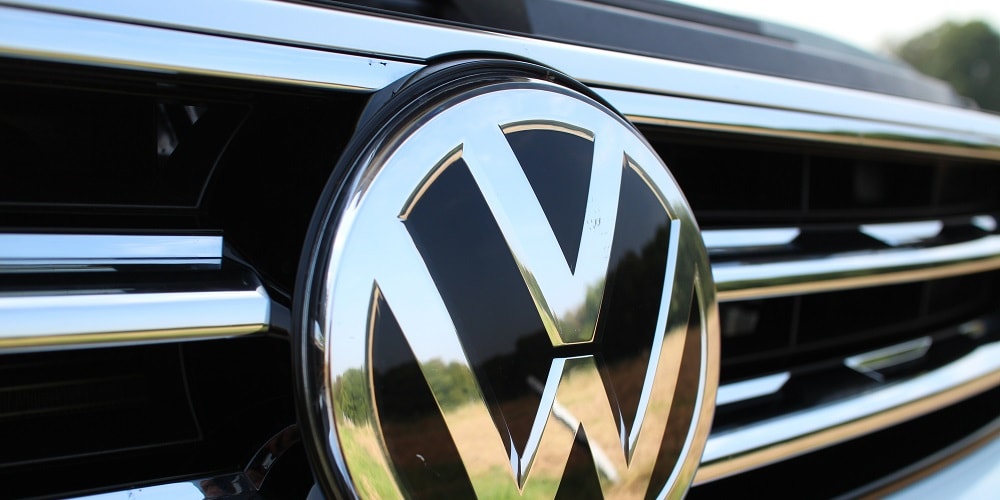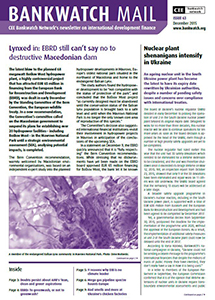NGO open letter to EIB president: don’t finance the Southern Gas Corridor
Publication | 28 January, 2016In this letter, a group of 27 non-governmental organisations urge the President of the European Investment Bank not to finance the Southern Gas Corridor, a 3500 kilometres-long chain of gas pipelines from Azerbaijan to Europe. As the EIB considers granting the biggest loan of its history to the Consortium in charge of developing the western section of the project, the Trans-Adriatic Pipeline (TAP), the group of NGOs warns about its most controversial aspects.
Read moreReport finds development banks fail people harmed by their projects
Press release | 27 January, 2016A new report launched today documents the hurdles communities and workers face in obtaining remedy from development banks whose projects cause them harm. The 11 civil society organizations that authored the report, Glass Half Full? The State of Accountability in Development Finance, call on development banks and the governments that run them to strengthen their systems for providing remedy to those harmed by the activities financed by the banks.
Read moreGlass Half Full? The state of accountability in development finance
Publication | 27 January, 2016Real development respects human rights and is shaped by the people it is designed to benefit. However, development projects financed by development finance institutions in many cases has been associated with the dispossession of land, loss of resources, diminished livelihoods and environmental degradation. Accountability mechanisms in theory aim to ensure that people who have been harmed by these projects receive adequate remedy. As this report shows, however, these accountability mechanisms to a large extent fail to fulfil this function, not least because they operate in a constrained environment constructed by the institutions that administer them.
Read moreSecond confirmatory application for disclosure of EIB documents related to Volkswagen loans
Publication | 25 January, 2016Following the revelations around Volkswagen cheating emission tests, Bankwatch requested information from the European Investment Bank about its loans to the car maker. After delays, incomplete disclosure, and a frist confirmatory application, the bank released on December 18, 2015 redacted finance contracts between the EIB and VW as well as redacted completion reports provided by VW to the EIB at the closure of each project. (See all documents here.)
Read moreUPDATED: New documents on European Investment Bank loans to Volkswagen
Blog entry | 18 January, 2016Documents obtained by Bankwatch provide more details for a European Investment Bank statement that its loans to Volkswagen may have been connected to the car makers use of cheating devices to rig emission tests.
Read moreReckless dam financing rampant in the Balkans
Publication | 17 December, 2015A new Bankwatch report has found that loans totalling EUR 818 million from international public ‘development’ banks have supported 75 hydropower projects in the Balkans, including 30 which directly affect protected areas such as national parks, Natura 2000 sites and Ramsar sites.
Read more9 reasons why the EU’s bank is no climate leader
Publication | 17 December, 2015In the run-up to, during and now, with a global deal reached, after the Paris climate summit, the world’s largest public lender, the European Investment Bank (EIB), is positioning itself as a climate pioneer. But is the bank really fit for this role? Can the EIB make a break from its history of financing fossil fuels and polluting forms of transportation after decades of cosy relations with the biggest culprits?
Read morePublic development banks failing 2 degree test, heavy fossil fuel financing persists
Publication | 17 December, 2015The MDB Climate Change Scorecard, published by Bank Information Center and Sierra Club during COP21, highlights how none of the world’s biggest multi-lateral development banks is on track to help keep the world below 2 degrees warming, and reveals how the seven banks in question – including the World Bank, the EIB and the EBRD – are continuing to support fossil fuel projects in developing countries.
Read more“Shaping the age of gas” – how the EU is locking in a destructive path
Publication | 17 December, 2015As efforts to realise a mega gas pipeline along the Southern Gas Corridor intensify, Re:Common’s Elena Gerebizza explains how democratic rights are at stake – and are being trampled on.
Read moreEU-backed fossil fuels binge needs to end in ‘neighbourhood’ countries
Publication | 17 December, 2015Bankwatch has been taking a look at EU financing for the energy sector in 16 European Neighbourhood countries between 2007 and 2014. Alarmingly, our research has uncovered that out of at least EUR 9 billion provided by the EU to energy projects in the ENP region during the period under assessment, more than EUR 4.2 billion in financing went to hydrocarbons in contrast to the EUR 1.5 billion awarded to low carbon sources of energy and energy efficiency projects.
Read more

